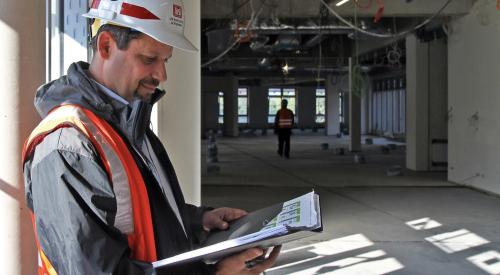Quality-oriented home building no longer begins and ends with builders. Trade contractors are quietly making their quality mark, from instituting process refinements to raising performance expectations beyond the competition's. Now the positive effects are moving up the food chain, straight to builders' bottom lines.
That's why Professional Builder and the NAHB Research Center opened the National Housing Quality Award competition to trade contractors for the first time last year. In October, Silver Awards were given to Tappe Construction Inc. of Eagan, Minn., and All-tech Inc. of Jamesburg, N.J. Each is a framing contractor with hundreds of field employees. But they also are lean, with systems and continually improving processes that make them invaluable home building partners.
All-tech Inc. Tappe Construction
| Mike Tappe, a crew and the standardized framing guidebook that Tappe Construction created.
|
Tapping Tappe Quality
Twenty years ago, Mike Tappe headed a small crew of framers from which he launched the company that bears his name. Bucking a trend toward one-man independent contractors in the Minneapolis/St. Paul market, his idea was to hire framers as full-time employees and invest heavily in training and equipment to make them the best at what they do - a radical notion at the time. More ambitiously, he later began to develop a career path for diligent employees willing to improve and progress along a detailed skills matrix.
Among the bottom-line benefits for builders that contract with Tappe Construction: lower cycle times thanks to highly trained, well-equipped crews; fewer callbacks and less warranty work thanks to consistency and standardization; and more efficient use of materials and labor as a result of guaranteed materials pricing.
Reduced cycle times and predictable timetables. Tappe Construction has become a learning-centered organization with foremen and crews who know their task and work well as a team. The result is a 30% to 50% reduction in framing cycle time compared with independent contractors', says Mike Tappe.
Brian Ramsey, the purchasing manager for Ryland Homes' Twin Cities division, likes the consistency and credibility of the times and dates Tappe gives for work completion.
"In 1998 Tappe had 0% of our business, and now they've got 35%. He will do about 200 units for us this year," says Ramsey. "For us, we are better able to project our dates from closing on in. If we need something done in 18 days rather than 20, we know they can do it if they say they can."
Fewer callbacks and reduced warranty work. Tappe pulled together its foremen several years ago to write a standardized framing guide and a standardized trim carpentry guide. Now, no matter which employee does a job, it's always done the same way.
No materials cost deviation with guaranteed delivery and pricing. "We include adequate amounts of material so there are no gaps in the scope of work," Tappe says. "Lumberyards typically don't guarantee their estimates; they guarantee unit prices. I guarantee the lump sum whether it is stolen, misused or I underbid it. I am taking responsibility and ownership for the accuracy of my takeoffs."
Ramsey likes the arrangement.
"One of the efficiencies with Tappe is that they are efficient and know where to trim waste," he says. "If there is a 10-foot 2-by-4, he's going to use 10 feet. He's not going to pay for 10 and use only 8."
| Jalsa Urubshurow, seated on table, at a weekly Monday meeting of All-tech foremen. Clear communication from top to bottom is a company hallmark.
|
All-tech Inc. Focuses on Prevention
Much of what makes framing contractor All-tech Inc. of Jamesburg, N.J., a valuable partner in the home building business is its front-loaded approach to bidding, planning and executing jobs.
All-tech won't bid a job unless all its questions about a set of plans are answered. This practice has matured into a formal bid review process that not only allows All-tech to deliver a more accurate bid but also uncovers potential plan problems. All-tech's questions about door and wall placement, for example, often bring errors to light, saving builder customers money.
"We see everything from doors that hit clothes dryers and windows so close to walls that there is not enough room for reveals to stairwell openings that don't match up," says All-tech founder and CEO Jalsa Urubshurow.
The firm's reputation for quality management eventually led to a key role in developing and piloting a quality certification program for framing contractors run by the NAHB Research Center. Last February, All-tech became the first company in the country to be certified under the standards, which are similar to ISO 9000 requirements.
Several best practices help All-tech make its builder clients more profitable:
Creation of simplified prints by CAD specialists and field personnel. Dedicated computer-aided design personnel create and update drawings that are "simplified" to a single page and show only framing, structural and engineered elements. The simplifieds can be used over and over, says All-tech president Don Perrin, and are key to providing the consistency that leads to fewer callbacks, lower cycle times and better overall quality.
Truss layout reviews. Idled cranes and crews can be the source of the greatest budget deviations on any project. These reviews allow time for the finer points of the connections and permanent bracing of a roof before the trusses arrive.
Progress-tracking procedures. All work is double-checked by All-tech employees devoted to quality assurance walk-throughs. There are a host of reports along the way, beginning with a foundation condition report. Well before lines are snapped, this report verifies that deviations and "humps" get fixed before they can push the frame out of whack.
"This is not something that we do because we're philanthropic," Urubshurow says. "If you have a 2-inch hump in the foundation, I believe it is wrong to build on it. It was not our mistake initially, but it becomes our shared fault at that point."












